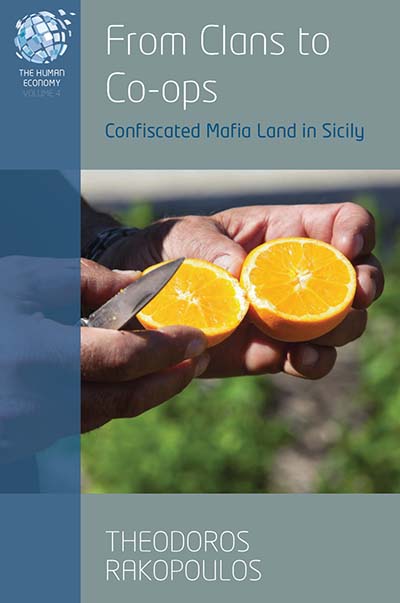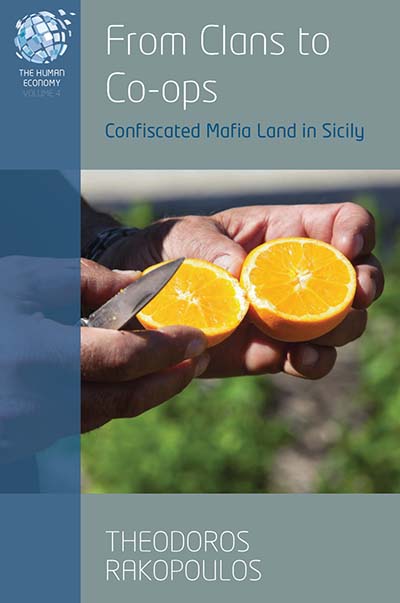
To mark the the first publication in paperback of his acclaimed From Clans to Co-ops: Confiscated Mafia Land in Sicily, Theodoros Rakopoulos kindly agreed to discuss his work, the fieldwork behind it, and how co-ops came to assume a role in the rejection of the mafia.
THEODOROS RAKOPOULOS is Associate Professor of Social Anthropology at the University of Oslo. He has most recently published on citizenship, property, statehood and conspiracy theory. His book Passport Island: The Market for EU Citizenship in Cyprus tackles citizenship by investment programmes and elite Russian migration to ‘Europe’ (Manchester University Press, 2023). He is editor of The Global Life of Austerity and co-editor of Towards an Anthropology of Wealth (with Knut Rio).
Congratulations on the publication of From Clans to Co-Ops in paperback! Before we begin, would you please tell us something of your research and studies to date?
So, I came to Anthropology relatively late, as I studied Law (LLB) and Political Science (MA) before. Then I did my PhD in Anthropology at Goldsmiths, under the supervision of Victoria Goddard and the late David Graeber. This book is a re-re-re-elaboration of that thesis. While completing it and for a couple years after, I also expanded beyond its scope to more tackle anthropological concerns present in the ethnography: silence, talk, masculinity, and moral borders. These are all pertinent to the book’s narrative, but I found the format of articles in classic anthropology journals to be more amenable a forum for more in depth analyses (outlets like Current Anthropology, Social Anthropology, PoLAR, and others). Anyway, preparing all this, I went through two post-docs in South Africa and in Norway, under the guidance of amazing people (Keith Hart and Bruce Kapferer, respectively). I was incredibly lucky to work with mind-blowing minds like David, Keith, and Bruce, through the early stages of my career.
During that time I also momentarily shifted my ethnographic focus to Greece, to tackle similar issues as per my Italian research (cooperatives, food) in a context of austerity and crisis, issues on which I also published extensively. But I also did a side project on conspiracy theory and fascism (my “hobby concept project”, as I like to call it). Of late, in the last 3-4 years, I have been writing on property, citizenship, and sovereignty exploring those in the context of another large Mediterranean island – Cyprus. I wrote a book about this – an ethnography titled Passport Island, which looks into the local citizenship by investment programme that commodified citizenship for the global rich, especially Russians.
The subject of your book is fascinating: the use of former mafiosi land for local co-operative business. Where did that idea come from and when did you first hear of it and decide you wanted to learn more?
I think I first heard about it in 2006, when I spent half a year of pre-fieldwork stay in Sicily, as I was inquiring on the contemporary antimafia movement. Every other person in the know would point to some new cooperatives in the West of the island. It was overtly exciting as it was a shape of things to come. A new coop was just born a couple years before then. Mafiosi were busy intimidating the coops, at the margins of their work. I just had to go there and live among the people of the coops. And so I did, establishing myself in a relatively small village I still do not name – but that is not far from Corleone, which most people would know, not least from the stereotypical mafia imagery of The Godfather.
The ethnographic stay involved no car blow ups, though. What it did involve is an anthropological realisation that this small part of Sicily has been at the forefront of antimafia mobilisation as working class praxis but also as a conceptual framework for decades. That is what I wanted to communicate. That, and the fact that strict ideologies of separation (as per mafia/antimafia), that the Italian state and media promote not only obfuscate social reality but also meddle with concepts as locally experienced.
Was that land previously farmed or used for anything or just simply owned by mafia families?
Land has huge symbolic power, in that it is endowed with meanings of continuity and permanence, as well as territorial control. As the mafia is literally “controllo di territorio”, clearly in this agrarian setting agricultural land was of huge importance to Mafiosi. The continuity here reflects kinship, clanship, genealogy, and ideologies of masculinity that cannot be underestimated. In fact, a good deal of the book delves into the anthropological question of what clans can mean today, and indeed in a European setting. Turns out, clanship ideology is constitutive of the property domain in mafia settings, which in turn impacts inheritance, which in turn created an odd patchwork of mafia and non-mafia land that the coops operate in. The ensued adjacency of land still cultivated by mafiosi and land the coops work on is a major impasse in local life. This situation lends itself to much of the ethnographic narrative, as the book explores uncomfortable proximity and the practical reality of being a neighbour with the “enemy”.
And who is now able to take advantage of this land and join a co-op?
Difficult to answer without getting into the technicalities of new regimes of labour in the area and among the coops. More conventional systems of recruitment have been instituted of late, less locals are involved and more high-end, graduate employees are preferred. Crucially, the antimafia element does not necessarily drive labour choices per se but rather informs the marketing of products and the company branding. This is a fascinating shift, indicative of contemporary capitalism’s nature: moral discourses dissipate from the domain of labour and are literally invested in the product. I have written about this drawing from new material, not only in Italian but also in Greek cooperatives.
Does an ‘anti-mafia’ feeling still persist? Is it an inspiration for those working the land now, or a badge of honour? Or is it not so relevant on the ground?
It is very relevant because the mafia is still around – Mateo Messina Denaro, Cosa Nostra leader, has just been arrested; but the organisation is far from obsolete. The antimafia is in many ways it is more relevant than ever, in some ways. The phenomenon described in its nascent stage in this book is now acknowledged as arguably the most successful victory over the mafia in Italian history in terms of active social change and beyond the juridical domain. More than a dozen years, almost fifteen, in fact, have passed, since I did the fieldwork that informed this ethnography. What I explored then was a bit of an intrepid, quirky phenomenon. Now it is well established. There are co-ops in the Catania province of the island, for instance. What is more, today there are several cooperatives across Italy operating on land confiscated from mafia organisations – not only from the Sicilian Cosa Nostra as in the case of the ethnography here, but also from the Neapolitan Camorra, the Sacra Corona Unita in Puglia and the ‘ndrangheta in Calabria. At the same time, the coops I worked with have changed to an extent, and assumed more corporate forms; that in itself might mean that a crucial aspect of their intended radicality is now under serious threat, substituted as it is by a language of the market.
How long did you spend there and do you know of any similar projects elsewhere?
As it is common for anthropology departments in the UK, my dissertation fieldwork lasted 12 months. I spent 6 more months in the field in Sicily right before that, getting prepared for the project. Fieldwork has this holistic experience and so one can never assess what part of it was more “productive” or whatever. Those 6 months I learnt so much about Italy and its largest island (not least about Italian pop culture, the Sicilian dialect, the state institutions) and established enduring friendships that also informed my work – so I consider them intrinsic to the book’s making.
Now it’s available in budget-friendly paperback, on which courses do you think From Clans to Co-Ops might make a useful addition to reading lists?
It has already been used in courses that focus on a regional interest, whether Anthropology of Europe or Anthropology of Italy or Anthropology of the Mediterranean, and on broader scope courses, as per Economic Anthropology and Economic Sociology mostly. Rereading it recently, as well as hearing new feedback from colleagues, I realised it should be an excellent choice for Legal Anthropology or Anthropology of Law, as well as Anthropology of the State, and more generally, Political Anthropology. It should also be useful to students of the sociology of law and criminology. The book has just been published in an Italian translation, too, and I am delighted with the reception by Italian colleagues so far.
How important is it to you that your book is also available as an Open Access ebook?
Very damn important. This is the digital age, as everyone calls it (or, do they, anymore?). It should also be the open access age. I won’t mince my words here: it is absurd that academics have little control over the accessibility of our work to communities outside the academy (and indeed to people in the scholarly community who work on temporary contracts, as who are independent researchers, or who are affiliated in institutions not rich enough to subscribe to big publishers). Open access culture should be at the forefront of cognitive and social struggles of our age. I am proud and delighted my book is open access – and I should thank the Norwegian universities’ healthy public funding for this.
And finally, can we ask what you are working on now?
Since I submitted my last book on citizenship, I slightly shifted focus, retaining the political anthropology interest. There are two main strands I work on at the moment. On the one hand, I have been looking at sovereignty – how do we make sense of a concept that is essentially legal in the everyday. Some have called for its abolition, as an empty signifier. Inspired by Schmitt, I am more sympathetic to the intrinsic power of the concept, not least because, for Cypriots, even if in its jural component (the de jure sovereignty of the Republic of Cyprus over the whole island), it is of the utmost importance – to an ontological degree, almost, when it comes to thinking about political community. I have published on sovereignty’s genealogical relation with property, and am mostly interested on what it does beyond statehood in general.
On the other hand, I have developed an active interest in decolonising debates. Working in a post-colonial, post-conflict setting such as Cyprus, and specifically working with refugees or the scion of refugees of the 1974 Turkish invasion and de facto partition, I am passionate about current scholarly and political discussions on postcoloniality and decoloniality. I am engaging this theory critically, and try to participate in these debates with a historical mind. I think relying on real-world evidence from ethnography and oral history to raise an anticolonial critique and also to shed light and explore nuances in the postcolonial experience is a more productive endeavour than context-blind theory that works across postcolonial settings. I am now working on micro-histories of the EOKA guerrilla forces in late 1950s Cyprus – a heroic struggle against imperialism but also one with many shady, dark aspects.

FROM CLANS TO CO-OPS: Confiscated Mafia Land in Sicily
240pp, 19 illus.; $34.95/£27.95 paperback
Hardback and Open Access digital editions also available
From Clans to Co-Ops is published in The Human Economy series. Find more about it here https://www.berghahnbooks.com/series/human-economy
If you want to know more about our books please sign up for our email newsletters in the subjects of your choice.
